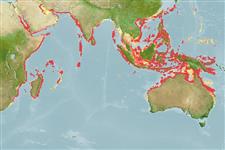>
Mulliformes (Goatfishes) >
Mullidae (Goatfishes)
Etymology: Parupeneus: Latin, parum, parvum = small + Peneus, the name of a river.
More on author: Lacepède.
Environment: milieu / climate zone / depth range / distribution range
Ecologia
marinhas associadas(os) a recifes; intervalo de profundidade 3 - 40 m (Ref. 90102). Tropical; 30°N - 31°S, 30°E - 154°E
Indo-West Pacific: Red Sea and Persian Gulf south to Natal, South Africa extending east to Indonesia and the Philippines. Record from Hawaiii is an error.
Comprimento de primeira maturação / Tamanho / Peso / Idade
Maturity: Lm 12.3 range ? - ? cm
Max length : 40.0 cm TL macho/indeterminado; (Ref. 30874); common length : 20.0 cm TL macho/indeterminado; (Ref. 9947)
Espinhos dorsais (total): 8; Raios dorsais (total): 9; Espinhos anais 1; Raios anais : 7. Diagnosis: Pectoral rays 15-17 (usually 16). Gill rakers 7-9 + 27-30 (total 34-39). Body moderately elongate, the depth 3.3-3.7 in SL; head length (HL) 2.8-3.2 in SL; snout length 1.7-1.9 in HL; barbels long, their length 1.1-1.25 in HL; longest dorsal spine 1.45-1.75 in HL; penultimate ray of second dorsal fin of adults 1.25-1.6 in last dorsal ray, the last ray relatively longer with growth; pectoral fins 1.3-1.5 in HL; pelvic fins 1.2-1.45 in HL. Body gray to grayish red dorsally, whitish to pink ventrally, with a black stripe from eye along lateral line to anterior part of caudal peduncle; a roundish black spot larger than eye on side of peduncle about two-thirds above lateral line; a broad white zone extending anterior to peduncular spot to below posterior part of second dorsal fin; a vertical pale blue line or spot often present on scales below black stripe; a dusky band often present on snout from eye to side of upper lip; barbels white; first dorsal and caudal fins reddish gray; basal one-third to one-half of second dorsal fin black, the dark pigment continuing to end of last ray and adjacent membrane; outer part of fin with narrow pale blue and yellow stripes; anal fin dusky yellow with faint narrow pale blue stripes (Ref. 54393).
Pale area at end of black stripe and dusky basal stripe in second dorsal fin distinguished it from the similar P. barberinus (Ref. 48636).
Inhabits lagoon and seaward reefs to over 25 m (Ref. 9710). Found on sandy or weedy bottoms (Ref. 30573); rarely at depths of more than 40 meters (Ref. 54393). Usually seen solitary but often several individuals nearby (Ref. 48636). Feeds mainly on crustaceans and worms (Ref. 54393).
Ciclo de vida ou comportamento de acasalamento
Maturidade | Reprodução | Desova | Ovos | Fecundidade | Larvas
Randall, J.E., 2004. Revision of the goatfish genus Parupeneus (Perciformes: Mullidae), with descriptions of two new species. Indo-Pac. Fish. (36):64 p. (Ref. 54393)
Status na Lista Vermelha da UICN (Ref. 130435)
Ameaça para os humanos
Harmless
Uso pelos humanos
Pescarias: espécies comerciais; Aquário: Espécies comerciais
Mais informação
ReferênciasAquaculturaPerfil para aquaculturaEstirpesGenéticaElectrophoresesHereditariedadeDoençasProcessamentoNutrientsConversão de massa
Ferramentas
Relatórios especiais
Baixar XML
Fontes da internet
Estimates based on models
Preferred temperature (Ref.
123201): 25.6 - 29.1, mean 28 °C (based on 870 cells).
Índice de diversidade filogenética (Ref.
82804): PD
50 = 0.5000 [Uniqueness, from 0.5 = low to 2.0 = high].
Bayesian length-weight: a=0.00912 (0.00570 - 0.01458), b=3.15 (3.02 - 3.28), in cm total length, based on LWR estimates for this species & Genus-body shape (Ref.
93245).
Nível Trófico (Ref.
69278): 3.5 ±0.37 se; based on food items.
Resiliência (Ref.
120179): médio(a), tempo mínimo de duplicação da população 1,4 - 4,4 anos (Preliminary K or Fecundity.).
Fishing Vulnerability (Ref.
59153): Low to moderate vulnerability (30 of 100).
Nutrients (Ref.
124155): Calcium = 31.6 [15.9, 70.8] mg/100g; Iron = 0.298 [0.151, 0.666] mg/100g; Protein = 17.9 [14.5, 20.9] %; Omega3 = 0.116 [0.066, 0.212] g/100g; Selenium = 50.4 [24.6, 111.4] μg/100g; VitaminA = 191 [37, 789] μg/100g; Zinc = 0.526 [0.315, 0.997] mg/100g (wet weight);
